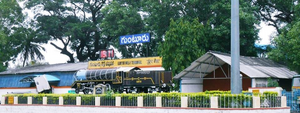Guntur Junction railway station
Guntur Junction | |||||||||||||||||||||
|---|---|---|---|---|---|---|---|---|---|---|---|---|---|---|---|---|---|---|---|---|---|
 Guntur railway station west terminal | |||||||||||||||||||||
| General information | |||||||||||||||||||||
| Location | Station Road E, Sambasiva Pet, Guntur, Guntur district, Andhra Pradesh India | ||||||||||||||||||||
| Coordinates | 16°18′03″N 80°26′34″E / 16.3008°N 80.4428°E | ||||||||||||||||||||
| Elevation | 31.89 metres (104.6 ft) | ||||||||||||||||||||
| Owned by | Indian Railways | ||||||||||||||||||||
| Operated by | South Coast Railway zone | ||||||||||||||||||||
| Line(s) | |||||||||||||||||||||
| Platforms | 7 | ||||||||||||||||||||
| Tracks | 10 | ||||||||||||||||||||
| Connections | Bus stand, Taxi stand. | ||||||||||||||||||||
| Construction | |||||||||||||||||||||
| Structure type | On ground | ||||||||||||||||||||
| Parking | Available | ||||||||||||||||||||
| Accessible | |||||||||||||||||||||
| Other information | |||||||||||||||||||||
| Station code | GNT | ||||||||||||||||||||
| Zone(s) | South Coast Railway | ||||||||||||||||||||
| Division(s) | Guntur | ||||||||||||||||||||
| History | |||||||||||||||||||||
| Opened | 1916 | ||||||||||||||||||||
| Passengers | |||||||||||||||||||||
| 37 million approx[citation needed] | |||||||||||||||||||||
| Services | |||||||||||||||||||||
| |||||||||||||||||||||
| |||||||||||||||||||||
Guntur railway station (station code:GNT[1]) is an Indian Railways station in Guntur of Andhra Pradesh. It is situated on the Krishna Canal–Guntur section of Guntur railway division in the South Coast Railway zone.[2][3]
History
The first rail lines in Guntur are of metre-gauge line opened Guntur–Repalle section in year 1916[4] and later between Guntur and Hubli/Goa.Later a broad-gauge rail line was built between GNT/VJA towards Howrah with the completion of Prakasam Barrage on River Krishna. By the end of the 20th century Guntur had 4 different railway lines passing through its junction.[citation needed]That railway lines is Guntur–Tenali section, Guntur–Vijayawada section, Guntur–Nallapadu-Guntakal section, Guntur–Nallapadu–Pagidipalli section.
Structure and amenities
Guntur railway station has seven platforms and two entrances, namely the East and the West.[5] These platforms are interconnected by subway system.[6] The station is equipped with facilities, such as dormitories, parcel office, retiring rooms, drinking water, booking counters, refreshment stalls, separate pathways for public, rampways for disabled people, parking zone for car and auto rickshaws etc.[7][8][5]Railways has formulated a plan to make station passenger friendly.A guidance system has been put in place in the station in which entry and exit points were numbered and major landmarks of the city have been displayed in foot-over-bridges[9].On average the station handles 43000 passengers daily and to facilitate easy movement multiple entry and exit gates are on both sides[10].The main entrance located at Railpet side is known as Guntur Government Hospital gate, and leads to platform 1.This entrance has been also named as terminal 1 and has gate numbers 1 to 7[11].The entrance on rear side is also known as Arundalpet side and has been named as terminal 2.Work is in progress for extension of platform no.8 and 9, to accommodate new trains at the railway station. In addition directional boards on the station premises helps in guidance of passengers.
Classification
Guntur Junction railway station is an A–category station. It is recognized as a Model station, Adarsh station and Touch & Feel (Modern Stations) in the Guntur railway division.[12]
Performance and earnings
As of September 2014[update], the station served thousands of commuting population by a total of 33 trains, of which 7 are MEMU and local trains.[13]
See also
References
- ^ "Station Code Index" (PDF). Portal of Indian Railways. 2015. p. 45. Retrieved 29 April 2019.
- ^ "Evolution of Guntur Division" (PDF). South Central Railway. p. 9,11. Retrieved 30 November 2015.
- ^ "Station: Nellore". South Coast Railway – Indian Railways. Retrieved 10 November 2016.
- ^ Andhra Pradesh District Gazetteers: Guntur by Andhra Pradesh (India), Bh Sivasankaranarayana, M. V. Rajagopal – 1977 – Page 188 In the years that followed, railway lines connecting Madras to Vijayawada (via) Tenali (1 898), Guntur to Repalle (1916) and Guntur to Macherla (1930) were opened.
- ^ a b MN, Samdani (11 February 2018). "Guntur railway station set to get swanky look, more facilities for passengers". The Times of India. Retrieved 22 May 2019.
- ^ MN, Samdani (20 April 2018). "Guntur station to get 'world-class' facilities | Vijayawada News". The Times of India. Retrieved 22 May 2019.
- ^ Reporter, Staff (1 March 2019). "Guntur railway station set for makeover at a cost of ₹11.25 crore". The Hindu. Retrieved 22 May 2019.
- ^ Reporter, Staff (18 April 2019). "Guntur railway station gets facelift". The Hindu. Retrieved 22 May 2019.
- ^ "Guntur railway station is more passenger friendly now". The New Indian Express. The New Indian Express. 10 June 2019. Retrieved 4 February 2021.
- ^ "Guntur railway station is more passenger friendly now". The New Indian Express. The New Indian Express. 10 June 2019. Retrieved 4 February 2021.
- ^ "Guntur railway station is more passenger friendly now". The New Indian Express. The New Indian Express. 10 June 2019. Retrieved 4 February 2021.
- ^ "Guntur Division" (PDF). South Central Railway. pp. 9, 11. Retrieved 18 January 2016.
- ^ "Guntur misses metro rail project". Deccan Chronicle. 22 September 2014. Retrieved 24 May 2017.
Template:Top 100 booking stations of Indian Railways




